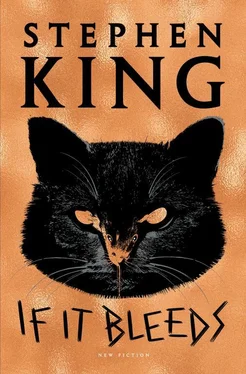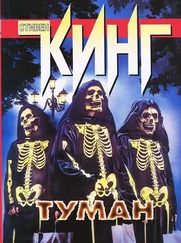5
The sleeplessness she expected doesn’t happen; Holly drops off within a matter of minutes. Perhaps crying with Jerome let out some of the poison the news from Pennsylvania had injected in her. Giving comfort and receiving it. As she slips away, she thinks she should talk about that with Allie Winters at their next session.
She wakes sometime deep in the early hours of December 9th, thinking about the correspondent, Ondowsky. Something about him—what? How tired he looked? The scratches and brick dust on his hands? The torn pocket?
That, she thinks. It must have been. Maybe I was dreaming about it.
She mutters briefly into the dark, a kind of prayer. “I miss you, Bill. I’m taking my Lexapro and I’m not smoking.”
Then she’s out and doesn’t wake up until the alarm goes at 6 A.M.
1
Finders Keepers has been able to move to the new, pricier digs on the fifth floor of the Frederick Building downtown because business has been good, and the rest of that week is busy for Holly and Pete. There’s no time for Holly to watch John Law and little to think about the school explosion in Pennsylvania, though the news reports continue and it never completely leaves her mind.
The agency has working relationships with two of the city’s big law firms, the white-shoe kind with lots of names on the door. “Macintosh, Winesap, and Spy,” Pete likes to joke. As retired police, he has no great love for lawyers, but he would be the second to admit (Holly would be the first) that subpoenas and process-serving pay very well. “Merry fucking Christmas to these guys,” Pete says as he goes out on Thursday morning with a briefcase full of woe and annoyance.
In addition to serving papers, Finders Keepers is on speed-dial at several insurance companies—locals, not affiliated with the big boys—and Holly spends most of Friday investigating an arson claim. It’s a pretty big one, the policy holder really needs the money, and she has been tasked with making sure that he was actually in Miami, as he claimed, when his warehouse went up in flames. Turns out he was, which is good for him but not so good for Lake Fidelity.
In addition to those things, which reliably pay the big bills, there’s an absconding debtor to track (Holly does this on her computer and locates him quickly by checking his credit charges), bail-jumpers to put on the radar—what’s known in the trade as skip-tracing—and lost kids and dogs. Pete usually goes after the kids, and when Jerome’s working, he’s great with the dogs.
She’s not surprised that Lucky’s death hit him so hard, not just because it was so extraordinarily cruel but because the Robinson family lost their beloved Odell to congestive heart failure the year before. There are no dogs on the docket, either lost or abducted, on that Thursday and Friday, which is good, because Holly is too busy and Jerome is at home, doing his own thing. The project that started as a school paper has now become a priority with him, if not an outright obsession. His folks are doubtful about their son’s decision to take what he calls “a gap year.” Holly isn’t. She doesn’t necessarily think Jerome is going to shock the world, but she has an idea he will make it sit up and take notice. She has faith in him. And Holly hope. That, too.
She can only follow developments on the middle school explosion out of the corner of her eye, and that’s okay, because there haven’t been many. Another victim has died—a teacher, not a student—and a number of kids with minor injuries have been released from various area hospitals. Mrs. Althea Keller, the only person who actually spoke to the delivery guy/bomber, has regained consciousness, but she had little to add, other than the fact that the package purported to be from a school in Scotland, and that cross-Atlantic relationship was in Pineborough’s weekly newspaper, along with a group photo of the Nemo Me Impune Lacessit Society (perhaps ironic but probably not, all eleven of the Impunies, as they called themselves, survived the explosion uninjured). The van was found in a nearby barn, wiped clean of prints and bleach-cleaned of DNA. The police have been inundated with calls from people eager to identify the perp, but none of the calls has produced results. Hopes of an early capture are being replaced by fears that the guy may not be done but only getting started. Holly hopes this isn’t so, but her experience with Brady Hartsfield makes her fear the worst. Best case scenario, she thinks (with a coldness that once would have been alien to her), he’s killed himself.
On Friday afternoon, as she’s finishing her report to Lake Fidelity, the phone rings. It’s her mother, and with news Holly has been dreading. She listens, she says the appropriate things, and she allows her mother to treat her as the child she thinks Holly still is (even though the purpose of this call will involve Holly acting like a grownup), asking if Holly is remembering to brush after every meal, if she is remembering to take her medication with food, if she is limiting her movies to four a week, etc., etc. Holly tries to ignore the headache her mother’s calls—and this call in particular—almost always bring on. She assures her mother that yes, she will be there on Sunday to help, and yes, she will be there by noon, so they can eat one more meal as a family.
My family, Holly thinks. My fracked-up family.
Because Jerome keeps his phone off when he’s working, she calls Tanya Robinson, Jerome and Barbara’s mom. Holly tells Tanya she won’t be able to eat Sunday dinner with them because she needs to go upstate. Kind of a family emergency. She explains, and Tanya says, “Oh, Holly. I’m so sorry to hear that, sweetie. Are you going to be all right?”
“Yes,” Holly says. It’s what she always says when someone asks her that horrible loaded question. She’s pretty sure she sounds okay, but as soon as she hangs up, she puts her hands over her face and begins to cry. It’s that sweetie that does it. To have someone call her, who was known in high school as Jibba-Jibba, sweetie.
To have that, at least, to come back to.
2
On Saturday night Holly plans her drive using the Waze app on her computer, factoring in a stop to pee and gas up her Prius. To get there by noon, she will have to leave at seven-thirty, which will give her time for a cup of tea (decaf), toast, and a boiled egg. With this groundwork laid to a nicety, she lies awake for two hours as she didn’t on the night after the Macready School blew up, and when she does sleep, she dreams of Chet Ondowsky. He is telling about the carnage he saw when he joined the first responders, and saying things he would never say on television. There was blood on the bricks, he says. There was a shoe with a foot still in it, he says. The little girl who cried for her mommy, he says, screamed in pain even though he tried to be gentle when he took her in his arms. He tells these things in his best just-the-facts voice, but as he talks he rends his clothes. Not just his suit coat pocket and sleeve, but first one lapel and then the other. He yanks off his tie and rips it in two. Then the shirt right down the front, popping off the buttons.
The dream either fades before he can go to work on the trousers of his suit, or her conscious mind refuses to remember it the next morning when her phone alarm goes off. In any case, she wakes feeling unrested, and she eats her egg and toast with no pleasure, just fueling up for what will be a trying day. She usually enjoys a road trip, but the prospect of this one sits on her shoulders like a physical weight.
Her little blue bag—what she thinks of as her notions bag—is by the door, packed with a clean change of clothes and her toiletries, in case she has to spend the night. She slides the strap onto her shoulder, takes the elevator down from her cozy little apartment, opens the door, and there is Jerome Robinson sitting on the front step. He’s drinking a Coke and his backpack with its JERRY GARCIA LIVES sticker is resting beside him.
Читать дальше








